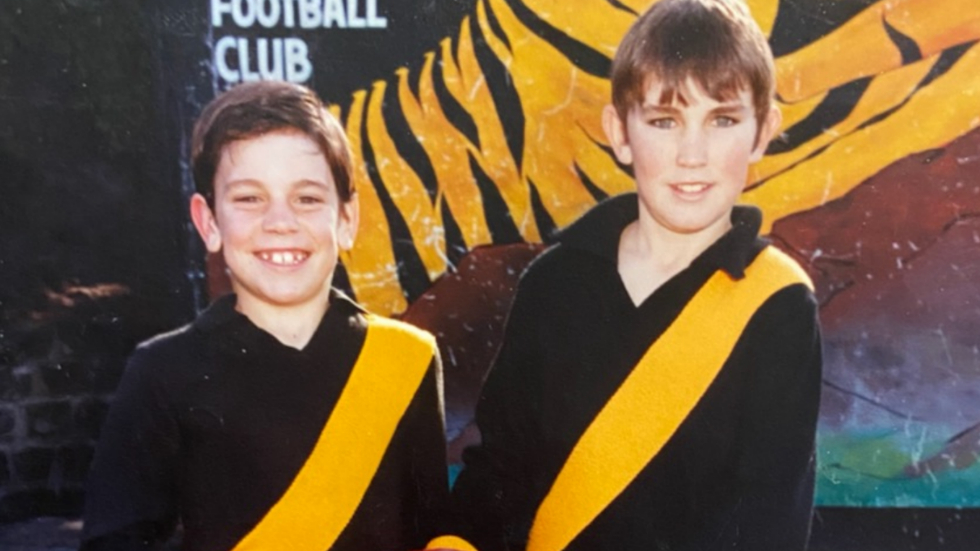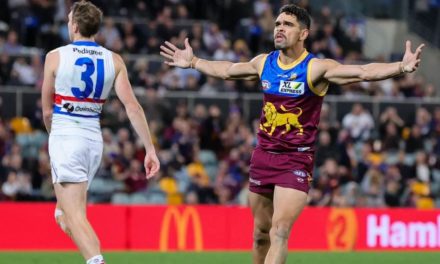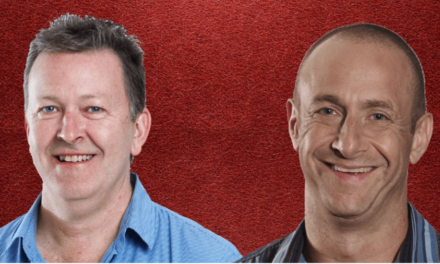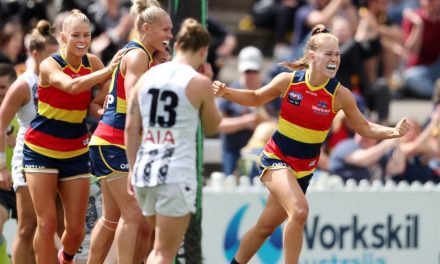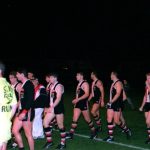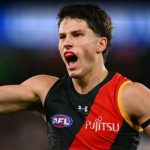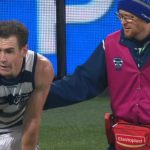ABC personality Paul Kennedy (left) with brother Steve at their junior football club Seaford.
Paul Kennedy’s voice is familiar, reassuring.
It takes me straight back to my old house, when he was the sports presenter on ABC mornings. It was a constant in the background as we prepared for the day, Vegemite toast in hand, looking for my school uniform.
Often on Monday mornings, or other days when a worry occurred about what might lay ahead or unfinished at school or work, Paul was there with sports news and, I guess, a reminder that everything would be okay.
Paul is over six foot and strong. Thick salt and pepper hair, understated and calm. He carries an air of authority. He’s the type of person who draws you in to learn more about what he thinks because it’s not front and centre.
Paul is a writer and journalist but most people know him through sport. It’s interwoven through his life. His mum loved football. A Collingwood supporter. His dad was his junior coach and grew up as a rugby player.
Paul remembers watching his older brother play in the under 10s, perched atop a ball, underneath the steel fence, following his brother end-to-end. In between quarters he would kick to himself, dive, return with muddied knees, awaiting his turn to join the ranks at Seaford Football Club.
In 1990, Paul lined up at Myer in Frankston for two nights, scoring three tickets to the grand final. Collingwood versus Essendon. A crowd of nearly 99,000 packed the MCG. He, his brother and his mum had to sit apart but he was up near the scoreboard, watching the full melee below at quarter-time.
There was Daicos, Gavin Brown. Tony Shaw won best on ground. There Paul was, watching a slice of history, a victory which his uncles before him, having only known drought, drank up. Driving away, Paul still couldn’t believe they’d won.
“It was one of the great days.”
And the times he shared with his three siblings, watching games together, playing with his brother, travelling to and from games with his mum and dad, who were an ever-present support. They offered quiet encouragement.

Kennedy pictured with the under-18 state squad in 1993. He missed out on playing for them.
No matter what time they left Waverley Park, they seemed to get stuck in the mud. Paul can see his dad marching off as soon as the siren sounded. They followed. About the only time he saw his dad flustered. Paul didn’t care how long it took to get out. He loved it with around the grounds on the radio in his dad’s old Holden. That sweet spot of comfort and familiarity, as the winter shadows began to engulf the changing light on the ground.
At 17, Paul was chosen to play for the Dandenong Stingrays in the old TAC Cup under 18s competition. Later on, my brother played for the Murray Bushrangers in the north-east. I had an understanding of what that meant to step up and perform. Mingle with new teammates. Be challenged, physically, mentally and socially. It was tough. Especially when the body hurt. I saw the blue-black bruises after the matches and heavy legs, feet seemingly poured in concrete. I saw the aftermath of injuries.
Paul was in peak physical shape when he joined the Stingrays. After a summer of preparation, by the time he reached the team camp, he was match fit. His coach believed he would win the sprint race. He did, and he was away.
In that same year, 1993, Paul was chosen to fill in for the VFL reserves, twice for St Kilda and the following year he was a player with Fitzroy, on their rookie list. On the day, he’d show up, be handed a jumper, and have to get in the zone. He had some good moments but said he felt a bit like an extra in a movie.
“I just felt like, I was worried that I looked out of place, that I didn’t belong. As much as I had imagined myself playing at that higher level, when that time came, when I filled in and I didn’t really know the players. I knew a couple of them from TV and reading the newspapers, but I felt out of place, so by the time I got out onto the ground, first game against Melbourne, I had to run around on Greg Healy, I felt like a bit of an imposter,” he said.
“You watch other players who step up at those moments, who get given a game in the AFL reserves and they look like they belong there, like they’ve been there forever, and I think that probably comes from their self-belief, or maybe they don’t overthink it. I was thinking too much about it.”
PLEASE HELP US CONTINUE TO THRIVE BY BECOMING AN OFFICIAL FOOTYOLOGY PATRON. JUST CLICK THIS LINK.
Paul was one of the many who could have played the big time, and nearly did, but it’s not often that we discuss what comes next, or the pang of disappointment that can linger for years, if not longer. A permanent corky.

Kennedy played for the Fitzroy reserves in 1994.
Paul’s book Funkytown is honest, and deeply familiar as such. It’s about Australian culture, football, growing up in the 80s and early 90s in Seaford, as a young man with ideas and indeed questions.
Paul pushed his body, training hard, playing hard, then often drinking to oblivion on Saturday nights after the footy.
In his book, Paul describes himself as having a ‘growing restless’ in that final year of school. He was interested in examining why, coming from a well-adjusted home, he went out with the intention of writing himself off.
More than once, Anthony Harvey, ‘Ant’, brother to Robert Harvey, both St Kilda alumni, had a quiet word to Paul. He was telling him not to throw his hard work away, to knuckle down and take his role on the field seriously. Once was the night before a big game when Paul was still out, still drinking. Once was on the field. He hooked Paul back into the flow of the game, getting him moving with the current, not against it.
When we talk, Paul said that a single person can change a football club. Change the feel. Provide an avenue for a better life. A person who comes to mind is a Samoan player that joined the Seaford club. His name was Donny Epa. His warmth and affection drew players in, to hug and talk like they hadn’t before. Tragically, he died in a train accident, but he was someone held dear and is missed. He had impact.
“I’ve always really loved that part of football, that you can have so many different people. Over the years, the different cultures did play its part. We had great experiences. I’ve seen football clubs change by one person walking through the door and shining their light on teammates,” he said.
In a critical way, Paul said that sport clubs provide men with a space to share more of themselves, so that they don’t suffer or become isolated. Which he knows for certain makes things worse.
While at times the experience as a young man around the club sidelines was impersonal, as Paul experimented with his own limits, for the most part, when the arc of play commenced, connecting with his teammates, in flow, it was a feeling of transcendence.

Kennedy (left) playing for Seaford under-17s in 1992.
He’s not a religious man, but in football, he finds a source of meaning that takes him elsewhere.
“To have a stab at something deeper, I’ve never had faith but what I have gained from football, and particularly passages I’ve worked into Funkytown, I feel like the joy you can get from being in a sporting team, for me, is something almost spiritual, if not spiritual,” he said.
“It pushed me to a higher plain. I’ve got nothing religious to compare it to but that’s how I feel. The elation. You feel great disappointment as well. Coming into the weekend you get nervous, and I don’t know what I would do with those nerves if not for competing and watching.”
Throughout his childhood, Paul would practice by the old light tower across the road from his house. Drop punts hard off the boot, sailing high. Artful torpedos spinning like a leaf in a gust of airborne flight. This freedom to play wasn’t abandoned.
After his year at the Stingrays came to a close, Paul went back to play for Seaford, alongside his brother and his mates. The joy of the game, the immersion, awaiting him. His experiences bettering as he got to know himself.
Several men have told me how much they enjoyed Paul’s book. They related to his experiences. I did, too. It was real.
The way I see it, if someone believes in you, and backs you, you can reach up, and oftentimes come into contact with your potential. The final trek is a lone one, where you have to pull on all reserves to believe in yourself.
Then there’s timing, conditions, focus.
I’ve seen past players and returned players who have reached peaks return to local clubs. Suburban, regional clubs. They provide oxygen in the lungs to lift the club. They bring excitement on the ground and a confidence about what can be achieved.
Before Christmas, I scarcely knew of Paul’s football history. Now it seems important to me. It’s important because I’ve read his story and I gathered my own sense of understanding about the course of life, and it’s changing nature. In that, we are not alone. Sport, in its unique way, can throw light onto what it is that we don’t understand, and enable us to communicate part of what we do.

